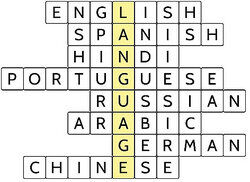Tatar Definition
tätər
noun
A member of a Turkic people living in a region of EC European Russia, the Crimea, and parts of Asia.
Webster's New World
A member of any of the Mongolian and Turkic peoples that took part in the invasion of central and W Asia and E Europe in the Middle Ages.
Webster's New World
Any of the Turkic languages of these peoples; esp., a language (Kazan Tatar) spoken around Kazan.
Webster's New World
Synonyms:
- Mongol Tatar
- tartar
pronoun
An agglutinative language belonging to the Uralian group of the Northwestern branch of Turkic languages. It is an official language of Tatarstan. There are some eight million speakers spread across Eastern Europe, Russia and Central Asia.
Wiktionary
adjective
Of Tatary or its peoples, languages, or cultures.
Webster's New World
Origin of Tatar
Persian Tātār of Turkic origin
From American Heritage Dictionary of the English Language, 5th Edition
-
From a Turkic language
From Wiktionary
Find Similar Words
Find similar words to Tatar using the buttons below.

